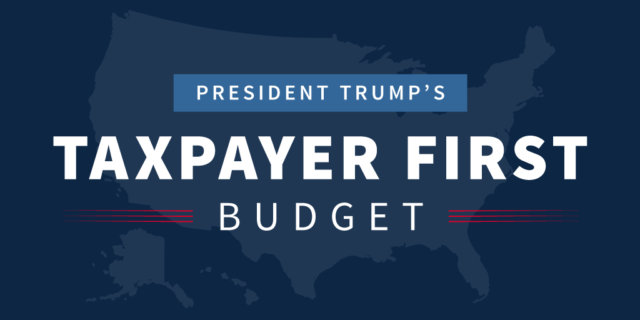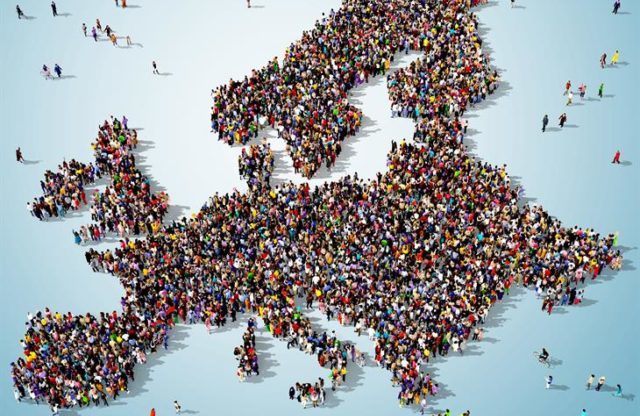After 2008, the US economy has experienced relative stagnation. The common refrain from the Left was that federal budget deficits weren’t big enough. Of the belief that government spending is what lifts economies out of slow-growth ruts, Paul Krugman, Lawrence Summers and other neo-Keynesians called for federal borrowing beyond what Treasury took in as a way of allegedly boosting the economy.
Who cares that excessive spending failed so impressively in the U.S. back in the 1930s, and who cares that massive increases in Japanese debt have failed to awaken its economy from its “lost decades?” The Keynesians most associated with America’s Left (they populate the Right too, but most who think this way don’t admit it, or know it) pointed to increased deficits as the certain source of our economic salvation.
This is interesting mainly because with the election of Donald Trump in 2016 in concert with promises of big tax cuts, the same left that cheered deficits as the path to recovery suddenly claimed they would hold the economy down. This requires mention as a reminder that budget deficits and national debt are political props, first and foremost.As for their economic implications, governments can only spend insofar as they tax or borrow from the private sector. Period. As such, and in a very real sense, all government spending is deficit spending; the deficits and national debt a bit of a distraction.
Spending Is What Matters
The level of government spending is what matters the most because the wealth we produce in the private sector is precious. The spending consumes capital that otherwise might reach innovators. Government spending is the worst kind of tax mainly because its horrors are mostly unseen.
Taxes we see and feel in each paycheck, devaluation of the dollars we earn (a tax like any other) we suffer through reduced work opportunity and spending power, but government spending represents the unseen; as in what would intrepid, innovative minds do with the expropriated capital if government weren’t consuming it?
How many Apple, Amazon and Microsoft equivalents haven’t, and will never emerge from start-up infancy thanks to government’s consumption of crucial resources, how long ago would cancer and heart disease have been cured; only for bright minds to train their genius on the erasure of other life-ending maladies, or the fulfillment of other market needs?
The Salsman View
All of the above at least partially explains why I approached Duke political economy professor Richard M. Salsman’s new book, The Political Economy of Public Debt: Three Centuries of Theory and Evidence, with some reservation.
Salsman’s genius and broad knowledge have long been evident, but e-mail exchanges over the years between author and reviewer revealed a friendly difference of opinion about budget deficits. Though no deficit “hawk,” Salsman views them as a problem in their present state, while I view government spending as the real problem. If given the choice between a balanced budget of $4 trillion, and annual deficits of $1.4 trillion on $1.5 trillion in spending, I would take the latter. In a heartbeat. It represents less government waste of precious capital to the tune of $2.5 trillion.
So while my views on what Salsman refers to as “public debt” haven’t changed much, Salsman’s book forced a very healthy rethink of the debt question, though for reasons different from the traditional critiques of deficit spending. And while this review will reveal some ongoing areas of disagreement with the author, none of the differences should be construed as a non-endorsement of what I’ll refer to going forward as “Public Debt.”Salsman has written something beyond special, a book dense with information and history that I’ll be referencing for years to come. It’s perhaps commonly thought that Carmen Reinhart and Kenneth Rogoff’s This Time Is Different is the definitive history of government debt, but Salsman’s Public Debt trumps their book by many miles. It’s quite simply spectacular, and informative in a way that few academic economics books (or, for that matter, any economics books) are.
To give readers a sense of how the book is constructed, it “examines three centuries of the most prominent political-economic theories of public debt.” Salsman addresses the debt through the eyes of some of the grandest names in economics, along with others who similarly deserve stature, but who have in a sense been forgotten. One of Salsman’s many triumphs is the staggering amount of research he conducted in order to explain to readers the myriad ways economists of different persuasions viewed government debt in the past, and how some do in the present.
Salsman divides up the economists of varying Schools into three groups. “Public debt pessimists” typically “argue that government provides no truly productive services,” that the “taxing and borrowing detract from the private economy, while unfairly burdening future generations,” plus they generally believe that government debts are “unsustainable and will likely bring national insolvency and perpetual economic stagnation.” David Hume, Adam Smith and Nobel Laureate James Buchanan were three public debt pessimists, and then the list today is endless: Niall Ferguson, Laurence Kotlikoff, David Stockman, etc. etc. To the debt pessimists, the world is seemingly always about to end.
“Public debt optimists” think “government provides not only productive services, such as infrastructure and social services,” but they also think deficit spending can lift economies out of “savings gluts, economic depressions, inflation, and secular stagnation.” Interesting about the optimists is that while they’re convinced of the wonders of deficits, they almost universally despise the creditors (the “rentier class”) who make deficits possible. Those who lend to governments in return for an income stream are almost invariably immoral financiers in the eyes of the optimists, and so the optimists fully support defaulting on those who provide government with the funds to waste.
Alvin Hansen and Abba Lerner are prominent in Public Debt as some of the old-style optimists, but the list of neo-optimists in today’s commentariat is similarly endless; think once again, Krugman, Summers, Alan Blinder, Christina Romer, etc. At book’s end, Salsman correctly points out that the “pessimists and optimists have more in common than is commonly realized – and each perpetuate long-established falsehoods.” Salsman was being kind….
The Realists
And then there are the “public debt realists.” They “contend that government can and should provide certain productive services,” but within strict limits. Realists neither whine all the time about world-ending government debts, nor do they claim that they can be essential sources of economic sustenance as the equally confused optimists believe.
Realists who favor “constitutionally limited government” don’t think public debt is “inevitably harmful” mainly because when government is limited, so will borrowing be. Alexander Hamilton was the most famous public debt realist. Of the moderns in our midst, Steve Forbes is a realist, so is George Gilder, and so of course is Salsman. More on your reviewer’s stance later.
Up front, public debt isn’t some recent concept reflecting the supposed immorality of the modern world whereby governments borrow today only to heartlessly pass the debt on to future generations. Salsman notes early on that public borrowing by governments such that the citizens were “ultimately responsible for servicing the debt” came about in the “late seventeenth century” through the issuance of “tangible securities traded in secondary, liquid markets with prices and yields visible on public exchanges.”People have long wanted a way to securely store wealth today in favor of future consumption tomorrow, governments have long looked for ways to borrow existing wealth, and financiers brought the two together. This isn’t to defend the public borrowing as much as it’s to say that it’s not something that arose in the 20th century.
The Founding
Going back to the U.S.’s founding, Salsman writes that “Alexander Hamilton and Thomas Jefferson differed pointedly over whether government should borrow at all, whether it should fully pay its debts (even when trading at a discount), whether the currency in which debts were to be repaid should be gold backed and of uniform consistency nationally or instead be cancelled, and whether private banking was legitimate. On all such questions Hamilton answered in the affirmative, Jefferson in the negative.” Based on Salsman’s analysis, Jefferson would be grouped with the pessimists, and Hamilton as mentioned with the realists.
Hamilton felt a national debt would be very additive to the U.S.’s early fortunes as a sign of the new country’s strength. Issuance of debt would “show the world the United States could and would pay its debts.” This was a particularly important signal to send to creditors analyzing what was again, a new country. Salsman is very clear that Hamilton wasn’t a “proto-Keynesian optimist” as much as the world was then, as it is now, uncertain. If the U.S. was seen as creditworthy, borrowing for national defense (defense spending a legitimate function of government in the eyes of realists) during times of war would be easier.
David Hume
At the same time the great philosopher David Hume said “sovereign borrowing breeds ‘poverty,’ national ‘impotence,’ and ‘subjection to foreign powers.'” Salsman classifies David Ricardo as a debt pessimist too, but acknowledges the differences within the group. Ricardo felt, like your reviewer, that “public spending itself constitutes the real economic burden, regardless of how funded, because it deprives private actors of the saving, capital accumulation, and productivity gains necessary for long-term prosperity.” Absolutely. Government spending brings instantaneous injury to the economy for it depriving the productive of resources that would otherwise be put to higher use.
On the optimist side Robert Malthus believed in the impossible whereby supply could exceed demand, so he viewed deficit spending “as a ‘cure’ for gluts.” Interesting there is that Malthus apparently knew, like Ricardo, that the spending dissolved wealth, but still felt it was necessary “to dissipate ‘excess’ aggregate supply.” A.C. Pigou was more sanguine about British borrowing since so much of the debt was owed within Britain itself.And to show how much Pigou influences public debt optimists today, Salsman adds that he cheered deficit spending that would redistribute the wealth of the rich to the middle class and poor “because they save less.” As Pigou put it, “The bulk of this money is pretty sure to be expended on the purchase of consumption goods, and so indirectly in creating money income for producers of those goods.”
Ok, per Pigou, the rich should be fleeced, then paid back a percentage of what was taken from them through consumption. Naturally Pigou’s analysis ignored that his scenario included no production, and worse, no investment in future production; investment that would have been more likely had the rich been able to hold onto their wealth in the first place. Fear not, it gets worse.
Secular Stagnation
Lawrence Summers’ hero Alvin Hansen, he of “secular stagnation” fame, felt “prodigality may be the appropriate social virtue in a society in equilibrium at underemployment.” Forget that savings never sit idle, and also forget that no economy can progress without the savings that fund innovation, to Hansen government issuance of debt with an eye on spending was a “means of providing adequate liquidity in a growing economy.”
Abba Lerner felt debt was ok since “we owe it to ourselves,” plus the debt wasn’t burdensome in a broad sense because debt payments are “received by the citizens and government bondholders.” This is perhaps what helped inform Keynes’s line about the “fools” in the economics profession who were allegedly carrying the banner for his views. For an economist to presume no present burden when government is extracting capital from the private economy is the height of foolishness. Fear not, however, it gets even stupider.
Thomas Piketty loves wealth redistribution while bemoaning debt because “it usually has to be repaid.” Piketty would prefer to “tax the wealthy rather than borrow from them.” To this endlessly naïve economist, when governments sell debt to the rich, the rich grow wealthier through ownership of bonds and their income streams. You can’t make this up, except that you don’t need to. Never forget that Piketty isn’t a fan of private investment either because in the process of capitalizing companies (on the way to voluminous opportunity creation for individuals), investors are getting rich in the process if their courageous investments bear fruit. When they succeed, it’s the rich getting richer.
Misesian Fresh Air
On the other hand, Ludwig von Mises was a breath of fresh air. Mises all-too-correctly pointed out that “Keynesian economics and the political process are almost entirely focused on short-run demand-side concerns while largely ignoring the long-run importance of economic productivity.” Precisely. Along these lines, a few years ago Alan Blinder penned an op-ed for the Wall Street Journal in which he talked up the allegedly positive demand implications that would spring from increased government spending. What he missed is that demand is always and everywhere the result of production first, and production is more abundant the more that savings and investment power enhancements that boost individual productivity.
Yes, Keynesianism is all about short-term demand, all at the expense of much greater production (and much greater subsequent demand) in the long-term given the truth that savings author progress. Demand is the easy part, and it’s not something economists or politicians should spend any time worrying about. Much thanks go to Salsman for compiling countless opinions on the subject of spending and debt. There are more to come, but this review will only scratch the surface.
Back to government spending in a broad sense, Salsman adds that government borrowing was relatively cheap in the 18th and 19th century (“typically 3-6 percent”) because “most sovereigns were fiscally prudent.” Other than issuing larger sums of debt during war, Salsman indicates that they “otherwise eschewed chronic budget deficits.” Of greater importance is that governments used “various pre-commitment devices – sinking funds, annuities, and the gold standard – to assure creditors of timely repayment in money that would hold its value over time.”
There’s no real mystery here behind the government debt surge. Governments could borrow because investors trusted the quality of the debt securities paying out income streams in currencies backed by gold, but most important was that good money correlated with surging investment, and subsequent economic growth.
Debt doesn’t power growth as much countries with growing economies can issue lots of debt. Add to all that a theme that Salsman returns to throughout Public Debt: “Only a state can legally compel tax paying, which is crucial to its capacity for debt servicing.” Governments can borrow fairly easily precisely because they can ultimately use force to extract payment on their debt from others. Debt servicing is logically much easier if the people are flush. The latter is important with the book’s future direction in mind.
Credit Worthy
Indeed, rich countries can borrow with ease. Poorer ones struggle to borrow, if at all. If readers doubt this, they need only pull up lists of the nations with the most debt versus the ones with very little. The big debtor nations are predictably the richest countries, while the ones with little debt are almost invariably the poorest. It’s worth repeating that this isn’t to say that deficits and debt power economies forward. Of course they don’t.
Government spending amounts to politicians misallocating precious resources that would otherwise be directed to their highest use by the profit motivated. Government spending is a huge tax on progress.
At the same time, politicians exist to spend. And if we don’t provide them with enough of our earnings, they’re happy to borrow against our future earnings. It’s much easier for them to borrow if investors feel the future earnings of the citizenry will be abundant, and easily taxable. Just as rich individuals and companies can borrow with ease, so can politicians who rule countries populated by the rich.The above truth brings us to one of many myths slayed by Salsman in his excellent book. Reinhart and Rogoff’s alleged insight that countries tip toward decline once their debt to GDP ratios move beyond 90 percent is accepted wisdom within the commentariat. Except that it’s not true. As Salsman reveals throughout Public Debt, England’s debt/GDP ratio reached the 261 percent mark in 1819, but far from it foretelling the country’s long decline, England was on the verge of a century of staggering growth. Considering the U.S., its debt/GDP ratio blew past 120 percent during World War II, only for the U.S. to experience pretty impressive post-war prosperity.
What To Do?
What all of this speaks to is that while debt isn’t on its own the source of country decline, socialistic responses to heavy debt loads are. High levels of taxation are what cause stagnation, and so do efforts by politicians to reduce their debt burdens sans payment. In pressing the previous point with great regularity, Salsman began to soften my broad dismissal of deficits. To me, they still don’t matter in a normal sense simply because the spending is the problem.
Bolstering the previous point for this reviewer, Salsman brings countless economic names from the past back from obscurity, including Italian aristocrat De Viti De Marco who asserted crucially that “the purchase of a public bond is voluntary, hence open to a self-interested, utility-maximizing calculus, while the payment of a tax is compulsory.” De Marco’s observation is one I’ve often made; as in it’s better if governments pay for the right to waste money than it is for them to take it from the productive without compensation. Again, deficits don’t matter. It’s the spending that does. That’s the tax, how the money is raised immaterial.
At the same time, Salsman’s exhaustive discussion of debt once again forced a rethink, and caused me to partially change my mind. No doubt spending is the real tax, but the problem with deficits is that while the borrowing is an act of government expropriating precious capital in order to waste it, we don’t feel it right then. No doubt we do soon enough, no doubt the waste leads to reduced innovation and lower pay, but it’s not seen as quickly and intimately as a direct tax. In that case, wouldn’t taxation meant to pay for all government spending free of borrowing force more prudence on politicians whose spending would fleece voters with tangible immediacy?
Along the same lines, the way in which public debt optimists have long dismissed the creditors, and worse, called for default on creditors (see Piketty), was a reminder of another horror of deficits; as in how politicians dispose of them.
Enter Keynes
Indeed, as one can imagine in a book about government debt, Salsman writes about how politicians go about shrinking it; albeit on the sly. This brings us to John Maynard Keynes. Though Salsman is very critical of the British economist, he indicates that “arguments for perpetual deficit spending and public debt accumulation come not from Keynes but Keynesians.” Those “fools” once again. While Keynes was in no way a public debt pessimist, “he never counseled unmitigated deficit spending.” More notable about Keynes is that while he had no problem with debt per se, he loathed creditors and sought “the euthanasia of the rentier” class.
Most important about Keynes from a public debt perspective is that in describing ways for governments to shrink their debt, he invariably offered up false solutions the harm of which would extend well beyond the supposedly “immoral” creditors.
Explaining Keynes’s suggested ways to default on debt, Salsman said governments could do so “explicitly (by a repudiation, or deliberate non-payment), implicitly (by inflation), and by a taking (levy on rentiers).” Governments have regularly employed the first two, and did so long before Keynes was prominent. Yet here’s the problem with deficits and debt: while government debt is an effect of the wealth produced by the citizenry, governments often respond the wrong way, thus adding insult to the wasteful borrowing/spending injury.
First up is repudiation or deliberate non-payment. To show just how delusional and contradictory are Keynesian debt optimists, they love the extra government spending that debt enables, but loathe the creditors who make the debt possible. Their position is impossible.
At the same time, I’ve long liked the idea of debt “haircuts” or repudiation not out of dislike for the creditors as much as maybe one or the other will cause creditors to skip buying government debt altogether. Arguably the latter would be more prevalent today if institutions like the IMF weren’t so ready to bail out governments, which has long been a way for governments to bail out banks and other creditors with high exposure to government debt.
Devaluation
Of course the much more problematic form of debt default or repudiation is devaluation of the income streams that debt securities pay out. Amazingly, Keynes well understood the horrid implications of devaluation, yet his dislike of creditors trumped the pain experienced by everyone thanks to devaluation. As Keynes so correctly put it, devaluation “is the form of taxation which the public find hardest to evade.”
While there are myriad ways for the citizenry to get around excessive headline rates of taxation, when governments repudiate debt through currency devaluation, everyone suffers. People earn dollars, pounds, euros, yen, and all manner of other currencies, which means devaluations meant to reduce government debt mean everyone suffers a shrinking paycheck. Much worse, the devaluation is a repellent to the very investors and savers whose capital commitments author economic progress to begin with.The point of all this is that deficits in isolation trump direct taxation as a way for governments to raise funds simply because they’re paying for the right to consume precious capital, as opposed to expropriating it without compensation for those fleeced. The problem is that deficits don’t occur in isolation. Or they don’t always. Precisely because governments want to borrow and spend sans the long-term implications of doing just that, we all frequently suffer the cruel tax that is devaluation so that wasteful governments can shrink what they owe.
To those who think the U.S. has never defaulted, think again. Even Reinhart and Rogoff described FDR’s 1933 decision to devalue the dollar from 1/20th of an ounce of gold to 1/35th as a debt default, and looked at in terms of the dollar since then, it’s apparent that the U.S. Treasury has been rampantly defaulting ever since. As of this writing a dollar buys 1/1200th of a gold ounce. America’s creditors have long suffered defaults, and the American people have had to accept the slower growth that is the tautological result of “implicit,” or “stealth” default. The seen is that despite Treasury’s horrid oversight of the dollar the U.S. remains the richest, most dynamic country in the world. But imagine the unseen. Imagine where the U.S. economy would be today absent the serial dollar devaluations that have needlessly shrunk investment that would have otherwise been directed to mass experimentation ahead of stunning advance.
Why Deficits are Bad
So, at risk of being repetitive, Salsman has me convinced of the horrors of deficits, but not for the reasons that compel most. Spending remains the problem. The problem with deficits is once again the socialistic responses of governments whereby they make everyone pay the massive, economy-sapping tax that is devaluation as a way of shrinking what they owe.
All of this speaks to another area of disagreement with Salsman ahead of the ones that will conclude this review. He correctly notes that the Keynesian “demand-side model was so discredited in the 1970s” in concert with vindication for supply-side economics, which “delivered such positive financial-economic results in the 1980s and 1990s.”
There’s no dispute that supply side won precisely because the latter is a tautology: when the tax, regulatory, tariff, and debased money barriers to production are shrunk, booming economic growth is the result. Supply side makes perfect sense, but it’s arguable that supply-siders have become ridiculous to the point that their policies have become self-suffocating. Indeed, supply siders, in their worship of the rising revenue implications of tax cuts, have forgotten that government spending is the biggest tax of all.
And in ignoring rising government spending, they’ve allowed the genius of their tax cut, deregulation, free trade, good money policy mix to be neutered. Figure that the posthumous John F. Kennedy tax cuts were great for economic growth, and as a result, gifted Treasury with a revenue surge in 1965. The latter gave Congress the means to for instance introduce Medicare; a program that was initially funded with $3 billion. The problem modernly is that a program which once cost $3 billion is projected to cost $1 trillion by 2025. Taking nothing away from the good of supply side policies, if not met with spending cuts, they’re not nearly as effective as they otherwise would be.
The Supply Side Problem
The problem with supply siders isn’t their belief that deficits don’t matter, but it’s a major problem their belief that government spending doesn’t matter. This reviewer wishes Salsman had spent more time on this point. As a deficit realist, Salsman plainly doesn’t like government expanding beyond strict constitutional limits. Ok, but rising federal revenues have enabled just that, not to mention that it’s much easier for governments to issue new debt if incoming tax revenues are abundant.Moving on from this quibble, Public Debt is wildly informative, and once again a magisterial myth slayer. Salsman spends a lot of time on Nobel Laureate James Buchanan’s contributions to the debt story, contributions that were important. He showed the “public choice” side of this whereby politicians act in what they deem their self-interest which is to spend with abandon.
At the same time, the public debt pessimist in Buchanan presumed to know a number, or a “critical threshold” after which government debt would cause economic decline. Buchanan offered a “moral case” for repudiation that supports Salsman’s wondrous contention previously mentioned that the pessimists and optimists are more alike than they know. Both sides endorse clipping the creditors who make all the waste possible.
As to magisterial myths slayed, through England and the U.S. Salsman as previously mentioned shows that if governments don’t respond to major debt with excessive socialism, it’s not an economy killer as Reinhart and Rogoff contend, and as did Buchanan. While England once again had a debt that was 261 percent of GDP as of 1819, by 1914, amid booming economic growth, the number had declined to roughly 35 percent.
The U.S. ratio as previously mentioned grew beyond 120 percent during World War II, but it shank to 35 percent by 1982. Japan presently has a debt/GDP ratio of over 225 percent. That it does exposes the absurdity of Krugman’s contention that deficit spending boosts growth, but at the same time it exposes as faulty the Reinhart/Rogoff magic number. Though not booming as it once did, Japan remains a very rich country. Rich countries can easily borrow. The problem is, as always, the spending. Imagine how much more advanced Japan’s economy would be today had its political class not responded to the country’s early 1990s recession with so much waste.
Deficits and Interest
Regarding the wildly popular view that deficit spending drives up interest rates, Salsman makes a mockery of what’s plainly absurd. Tracking the deficit spending of G-7 nations, Salsman finds that amid average debt/GDP ratios of 37.7 percent in 1980, the average interest rate on 10-year government bonds paid by those countries was 11.9 percent. Fast forward to 2000 when the debt/GDP ratio for those same countries was 74.5 percent, the average rate was 5 percent. In 2015, with the debt/GDP ratio having surged to 116 percent, the average 10-year government bond coupon was 1.3 percent. Though it’s common to say that rising deficits correlate with rising rates to service those deficits, there’s no evidence that the latter is true. Salsman’s book is beyond valuable, yet at the same time his statistics unearth another quibble.
On the same page that he provides the above numbers, Salsman contends that central banks “now also act as lenders of last resort to profligate governments,” and that the “reach of central banking expands virtually without limit.” Salsman’s explicit contention is that politicians created central banks to enable their borrowing given his oft-stated view that there’s “no effective limit on central banks’ power and willingness to create fiat money.”
This is not compelling. Sure enough, in communications with Salsman he’s acknowledged that most vastly overstate the power of the Fed, and central banks in general. How then could that which interacts with increasingly neutered banks have so much economic influence, let alone enable broad debt issuance by governments? My view here is that Salsman reverses causation. Central banks that buy a lot of government debt are a certain effect of an otherwise powerful economy, as opposed to an enabler of government debt issuance.
My evidence is Salsman’s very own mention of England’s adoption of a gold standard after the Glorious Revolution. Once a desperately poor country, the issuance of good money authored an economic surge that enabled borrowing that subsequently enabled England’s wars, and its colonization of one quarter of the world’s land mass.
In Salsman’s case, he cites the establishment of Britain’s Bank of England in 1694 as the facilitator of Britain’s “financing yet another war with France.” Ok, but if all it took for France to fight toe to toe with England was a central bank, then it could have mimicked Britain’s establishment of one. In truth, what enabled England’s warring was economic growth that gifted its politicians with abundant revenues, not a supposed lender of last resort to governments. Salsman himself references central bank independence as “a mere shibboleth,” which reminds us that any purchasing of debt amounts to one government entity buying from another.
Reducing all of this to the absurd, if central banks could truly enable reckless spending, the central banks of Nigeria and Bahamas could theoretically monetize massive government growth, as could the creation of a central bank in Haiti. But nothing like the latter would materialize simply because central banks can’t alter economic reality. If a government is “desperate for funds,” why the need for a central bank in the first place? What could a central bank do?
Going back to his assertion that there’s “no effective limit on central banks’ power to and willingness to create fiat money,” Salsman is making somewhat of a Keynesian statement himself (in fairness, members of the Austrian School regularly commit the same error) in presuming that central banks, for being central banks, can fix the alleged problem of credit scarcity. But they can’t. Individuals, businesses and governments seek access to “central bank notes” not to stare at the money, but instead do so because of what “money” can be exchanged for.
Credit is always and everywhere created in the private sector; money just a measure that facilitates its exchange and its direction toward future wealth creation. In short, the limit on central banks is that governments, like individuals and businesses, want to exchange money for real things. None of this means that government always does a good job with money, but it does mean central banks are a sideshow contra Salsman and other central bank critics. Much as central bank critics might wish otherwise, and much as the very existence of central banks is an offense to common sense, governments themselves ultimately decide whether to issue good or bad money, not central banks as is so commonly assumed.
Democracy and Deficit
Salsman is not a friend of democracy, and with good reason. Like most reasonable thinkers, he prefers a constitutionally limited federal republic that has very little power; spending or otherwise. Unrestrained democracy is unquestionably bad simply because it empowers the mob to theoretically vote all manner of benefits to itself on the backs of others. Where we part ways somewhat is in his assertion that democracy is the source of excessive spending.
Politicians who exist to spend. If the money’s there, they’ll spend it. India is a democracy, but the size of its debt isn’t very notable. What ultimately powers spending and borrowing is the wealth of the citizenry that sadly gifts politicians with surging revenue streams that enable endless spending and borrowing. Rich countries can borrow, and they do. The fix is constitutionally limited government. Always.
Lastly, Salsman asserts that “political elites’ electoral incentive is to maximize spending, minimize taxation, and borrow or print money to plug the gap, while treating wealth minority groups and future generations as fiscal commons worth exploiting.” This doesn’t ring true.
Indeed, to separate direct taxation from borrowing and spending is to make a distinction without a difference. Either way, the damage done by government is immediate since government spending (even that which is constitutional) amounts to instantaneous mis-allocation of precious resources. As for the popular notion that deficits burden future generations, it’s accepted wisdom that is also utter nonsense. The burden isn’t debt that can easily be grown out of if government is limited.
More realistically, we all suffer government spending in the here and now thanks to greatly reduced progress wrought by government consuming the resources necessary for advance. As for future generations, the true burden of spending in the here and now is that experimentation and advance that would have otherwise taken place in the past, only to set the stage for greater advance in the future, hasn’t happened.
The burden we leave for those in the future is a world that is much less advanced than it otherwise would be. The spending burdens future generations with work and experimentation that would have otherwise already been completed, and that will detract from much more productive toil had government not previously wasted resources. Something tells me Salsman knows this, but the idea of debt as “someone else’s” burden is very much ingrained.
Still, the minor quibbles should in no way be taken as a reason for readers to not purchase The Political Economy of Public Debt. Richard Salsman has written an endlessly excellent book that expertly tells the story of debt and its implications. Readers will come away exponentially more knowledgeable, and with minds that have been changed at the very least a little, but most likely a lot.
Readers will come away exponentially more knowledgeable, and with minds that have been changed at the very least a little, but most likely a lot.
 John Tamny is a Forbes contributor, editor of RealClearMarkets, a senior fellow in economics at Reason, and a senior economic adviser to Toreador Research & Trading. He’s the author of the 2016 book Who Needs the Fed? (Encounter), along with Popular Economics (Regnery Publishing, 2015).
John Tamny is a Forbes contributor, editor of RealClearMarkets, a senior fellow in economics at Reason, and a senior economic adviser to Toreador Research & Trading. He’s the author of the 2016 book Who Needs the Fed? (Encounter), along with Popular Economics (Regnery Publishing, 2015).
EDITORS NOTE: Get trained for success by leading entrepreneurs. Learn more at FEEcon.org
 Eric Peters is an automotive journalist. Eric started out writing about cars for mainstream media outlets such as The Washington Times, Detroit News and Free Press, Investors Business Daily, The American Spectator, National Review, the Chicago Tribune and Wall Street Journal.
Eric Peters is an automotive journalist. Eric started out writing about cars for mainstream media outlets such as The Washington Times, Detroit News and Free Press, Investors Business Daily, The American Spectator, National Review, the Chicago Tribune and Wall Street Journal.


 an unholy alliance to extract as much money as possible from the state’s beleaguered private sector.
an unholy alliance to extract as much money as possible from the state’s beleaguered private sector.

 It’s worth noting that the high-tax approach is
It’s worth noting that the high-tax approach is  Heck, they want to increase all sorts of taxes. Including higher burdens on the financial industry.
Heck, they want to increase all sorts of taxes. Including higher burdens on the financial industry.


 An article in Saturday’s Wall Street Journal about the European leg of President Trump’s first foreign trip came with the headline: “Leaders Confront US on Russia, Climate.” In particular, non-US G-7 leaders are all strongly in favor of the 2015 Paris climate agreement that would require participating countries to limit carbon emissions, among other restraints on economic activity.
An article in Saturday’s Wall Street Journal about the European leg of President Trump’s first foreign trip came with the headline: “Leaders Confront US on Russia, Climate.” In particular, non-US G-7 leaders are all strongly in favor of the 2015 Paris climate agreement that would require participating countries to limit carbon emissions, among other restraints on economic activity. John Tamny is a Forbes contributor, editor of RealClearMarkets, a senior fellow in economics at Reason, and a senior economic adviser to Toreador Research & Trading. He’s the author of the 2016 book
John Tamny is a Forbes contributor, editor of RealClearMarkets, a senior fellow in economics at Reason, and a senior economic adviser to Toreador Research & Trading. He’s the author of the 2016 book 
 John Tamny is a Forbes contributor, editor of RealClearMarkets, a senior fellow in economics at Reason, and a senior economic adviser to Toreador Research & Trading. He’s the author of the 2016 book
John Tamny is a Forbes contributor, editor of RealClearMarkets, a senior fellow in economics at Reason, and a senior economic adviser to Toreador Research & Trading. He’s the author of the 2016 book 

 Jeffrey Tucker is Director of Content for the
Jeffrey Tucker is Director of Content for the 








 If society understood the reality of collectivism instead of the promise of collectivism then their support for collectivism would vanish.
If society understood the reality of collectivism instead of the promise of collectivism then their support for collectivism would vanish.



 Steven Horwitz is the Schnatter Distinguished Professor of Free Enterprise in the Department of Economics at Ball State University, where he also is a Fellow at the John H. Schnatter Institute for Entrepreneurship and Free Enterprise. He is the author of
Steven Horwitz is the Schnatter Distinguished Professor of Free Enterprise in the Department of Economics at Ball State University, where he also is a Fellow at the John H. Schnatter Institute for Entrepreneurship and Free Enterprise. He is the author of 








 Rachel served as Ron Paul’s communications director on Capitol Hill for 5 years. She is now a freelance-from-home wife and mom who writes extensively about gold and financial markets and occasionally consults on political campaigns, most recently for Sean Haugh for US Senate.
Rachel served as Ron Paul’s communications director on Capitol Hill for 5 years. She is now a freelance-from-home wife and mom who writes extensively about gold and financial markets and occasionally consults on political campaigns, most recently for Sean Haugh for US Senate.


